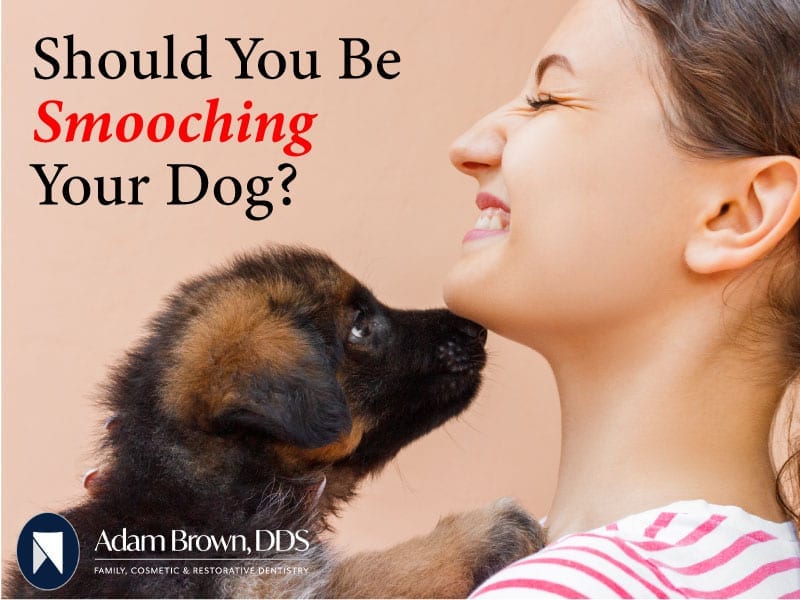
We love our pets, and as we find ourselves spending more time at home these days, an upside is being able to hang out with our little (or big) furry friends. But, if you are a dog owner could your oral health be at risk? Studies indicate those sweet doggy kisses we look forward to every day might be negatively impacting our gums and teeth.
Recent research shows that pets, such as dogs and cats, share the same type of bacteria as humans that causes periodontal (or gum) disease. However, despite the fact we share the same or similar oral bacteria, there is no scientific evidence showing that humans can actually develop gum disease directly from a pet. In fact, there have been certain defenses found in the mouths of humans that actually combat outside germs, such as those from dogs and cats, and prevent them from developing into gingivitis, cavities, gum disease, etc. But, simply knowing there is a chance of contracting something like gingivitis from your dog means we should look into it more.
Gingivitis is not something anyone wants, as it is a mild form of gum disease that is fairly common among American adults. If you notice your gums beginning to recede and turn white, gingivitis is most likely the culprit. A few other signs include swollen and bleeding gums, even painful irritation and loose teeth. The most common cause of gingivitis is poor oral care, so if you have fallen off the wagon a bit, it’s best to get right back into the routine of brushing and flossing regularly to keep from this uncomfortable situation, especially if you are a pet lover.
The fact is, your dog’s mouth is disgusting and teeming with germs. Simply relying on your body’s own defense systems to keep you healthy may not be wise. And it’s not just your oral health that could be at risk.
What You Could Catch
The odds are slim you will get sick from kissing your pet, but there is still a chance. So what could you catch?
According to the CDC, campylobacteriosis is the most common infection given to humans from their pets. Campylobacteriosis sounds like a good time, but it is actually an infection transmitted by the stool of an animal—an animal that may or may not seem or look sick. As we all know, animals tend to lick their rear-ends causing them to pick up particles of stool into their saliva, and well…there you go.
Once this is transmitted to a human, it can cause diarrhea, fever, and stomach pain.
Giardia is another infection that can be transmitted from our pets. This is a tiny, intestinal parasite that can cause the following:
- Diarrhea
- Stomach Pain
- Nausea
- Gas
- Vomiting
Giardia is spread by the animal swallowing stool particles containing the parasite and passing it on to you; however, the risk of contracting this infection from your dog or cat is extremely low.
Keeping Your Mouth Clean
The good news is there are ways to build up your own defenses against these nasty infections, and the best way to maintain a healthy relationship with your pet is by maintaining your own oral health. Follow these procedures and keep your mouth clean!
- Begin by brushing correctly. The best way is to brush in small, circular motions. This will keep the toothbrush bristles from pushing your gums away from your teeth, which causes irritations that can lead to any of the conditions previously listed.
- Floss every day. Flossing is incredibly important for your oral health. This keeps food from resting between your teeth, which begins to rot and aid in gum disease. Floss every morning or at night right before bed. Be sure not to jam the floss down on your gums. Use soft, clean motions, going back and forth. Hit every area between the teeth and rinse with water or mouthwash after.
- Watch your diet. Sugary drinks and foods, alcoholic beverages, even fatty meats can all have negative effects on your gums. You don’t necessarily have to cut these things out of your diet completely, but if you are the type of person who enjoys these on a regular basis, try and cut back a bit. At the very least, make sure you brush your teeth right after eating or drinking sugary or fatty substances.
Carolina’s Dental Choice wants you to keep up on your oral health and show your pets the attention they need.
*Source: https://www.self.com/story/kissing-pet-health-effects
